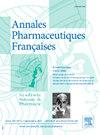Évaluation de la faisabilité du dispositif d’auto-administration des médicaments par le patient dans un centre hospitalier universitaire : audits de pratique et recommandations pour une mise en œuvre sûre
IF 1
Q4 PHARMACOLOGY & PHARMACY
引用次数: 0
Abstract
En 2022, la HAS a émis des recommandations sur l’auto-administration des médicaments, destinée aux patients volontaires en hospitalisation, sous accord médical. L’objectif de notre étude est d’évaluer les pratiques liées à la gestion des médicaments dans notre établissement afin de proposer des recommandations pour une mise en œuvre sûre du dispositif d’auto-administration des médicaments. Une étude monocentrique prospective a été menée entre janvier et juin 2023. Deux audits ont été réalisés auprès des patients et des infirmier(e)s à l’aide de questionnaires basés sur les recommandations de la HAS. Sur un total de 207 patients, avec un âge moyen de 59,6 ans, 56 % étaient favorables à gérer les traitements initiés à l’hôpital. Parmi ceux ayant des traitements habituels, 62 % étaient favorables pour continuer à les gérer à l’hôpital. Dans les unités d’hospitalisation de semaine, 92 % des patients étaient favorables à la gestion de leurs traitements habituels, et 75 % à ceux initiés à l’hôpital. Parmi les 26 infirmier(e)s interrogé(e)s, 71 % ont noté l’autonomie des patients pour la prise médicamenteuse dans les transmissions narratives, 88 % ont vérifié la prise médicamenteuse en auto-administration, et 96 % l’ont tracée informatiquement. Le dispositif d’auto-administration des médicaments est envisageable dans notre établissement, notamment dans les unités d’hospitalisation de semaine avec des patients ayant une bonne connaissance de leurs traitements. Actuellement, les infirmier(e)s évaluent et assurent la traçabilité de l’autonomie du patient sans outils spécifiques. Pour garantir le succès de cette nouvelle approche, une collaboration entre les professionnels de santé est essentielle, avec un rôle central du pharmacien.
The French Health Authority recently published guidelines about patient self-administration of medications for voluntary hospitalized patients under medical supervision. This study aimed to assess medication management practices in our hospital and provide recommendations for self-administration medication. A prospective monocentric study was performed from January to June 2023, involving patient and nurse surveys based on the guidelines from the French Health Authority. A total of 207 patients participated in the survey, with a mean age of 59.6 years. Among them, 56% were inclined to self-manage treatments initiated during hospitalization. Among patients with regular treatments, 62% were inclined to self-manage them in the hospital. In weekday hospitalization units, 92% of patients were inclined to self-manage their regular treatments, and 75% of those initiated during hospitalization. Among the 26 surveyed nurses, 71% reported patient autonomy for taking drugs in narrative transmissions, and 88% verified medication intake through self-administration, while 96% digitally traced it. The concept of self-administration of medication appears promising, especially within weekday hospitalization units, particularly for patients with a good understanding of their treatment. Nurses currently assess patient autonomy without specific monitoring tools. Collaborative efforts among healthcare professionals, with pharmacists playing a central role, are essential for the success of this innovative approach.
[大学医院药物自助管理可行性评估:临床审计和建议]。
法国卫生局最近发布了关于自愿住院患者在医生指导下自行用药的指南。这项研究旨在评估我院的用药管理实践,并为患者自行用药提供建议。2023年1月至6月期间,我们根据法国卫生局的指南开展了一项前瞻性单中心研究,对患者和护士进行了问卷调查。其中,56%的患者倾向于自我管理住院期间开始的治疗。在定期接受治疗的患者中,62%的人倾向于在住院期间自行管理治疗。在平日住院的病房中,92% 的患者倾向于自我管理常规治疗,75% 的患者倾向于在住院期间开始自我管理治疗。在接受调查的 26 名护士中,71% 的护士在叙述性转述中报告了病人服药的自主性,88% 的护士通过自我服药核实了药物摄入量,96% 的护士通过数字追踪核实了药物摄入量。目前,护士在评估患者自主性时并没有特定的监测工具。医护人员之间的合作对于这种创新方法的成功至关重要,而药剂师则扮演着核心角色。
本文章由计算机程序翻译,如有差异,请以英文原文为准。
求助全文
约1分钟内获得全文
求助全文
来源期刊

Annales pharmaceutiques francaises
PHARMACOLOGY & PHARMACY-
CiteScore
1.70
自引率
7.70%
发文量
98
期刊介绍:
This journal proposes a scientific information validated and indexed to be informed about the last research works in all the domains interesting the pharmacy. The original works, general reviews, the focusing, the brief notes, subjected by the best academics and the professionals, propose a synthetic approach of the last progress accomplished in the concerned sectors. The thematic Sessions and the – life of the Academy – resume the communications which, presented in front of the national Academy of pharmacy, are in the heart of the current events.
 求助内容:
求助内容: 应助结果提醒方式:
应助结果提醒方式:


